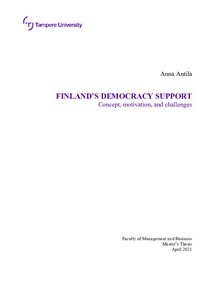Finland’s Democracy Support: Concept, motivation, and challenges.
Antila, Anna (2021)
Antila, Anna
2021
Politiikan tutkimuksen maisteriohjelma - Master's Programme in Politics
Johtamisen ja talouden tiedekunta - Faculty of Management and Business
This publication is copyrighted. You may download, display and print it for Your own personal use. Commercial use is prohibited.
Hyväksymispäivämäärä
2021-05-21
Julkaisun pysyvä osoite on
https://urn.fi/URN:NBN:fi:tuni-202104263612
https://urn.fi/URN:NBN:fi:tuni-202104263612
Tiivistelmä
This Master’s Thesis explores Finland’s democracy support from the perspective of the Ministry for Foreign Affairs of Finland. Democracy support means the policies and actions which seek to influence other states towards democracy, strengthen their democracy or consolidate their emerging democracy. It can be put into practice by, for example, political dialogue, foreign aid, and election observation. Supporting democracy can be seen as a resilient part of Western democracies’ foreign policy. Democracy support has been a part of Finland’s foreign and development policy since the 1990s. Currently, promoting democracy is acknowledged as an important part of foreign policy, and democracy is included as one of the main priority areas of Finnish development cooperation.
The study is based on a qualitative content analysis, firstly, of 18 documents on foreign policy, development cooperation and democracy support produced by the Foreign Ministry, and secondly, on six interviews of senior-level civil servants working with development cooperation and democracy support within the Ministry. The analysis uses an analytical framework of four themes: 1) the concept of democracy, 2) good governance and its relationship to democracy, 3) motivation for democracy support, and 4) challenges in democracy support. Through the qualitative content analysis of these two types of data, three to eight subthemes were constructed under each of the main analytical themes of the framework.
The study found that Finland has a broad understanding of democracy, which links together democracy, human rights, the rule of law and good governance. Good governance is an inherent part of Finland’s democracy support, but its relationship as a concept to democracy is vague. Analysis indicates that potential motivating factors for democracy support are the value of democracy as well as how democracy is seen to reinforce other goals in Finnish foreign policy and development cooperation. The challenges in democracy support were mostly linked to how democratic developments are volatile and possibly slow, and the interviewees saw a discrepancy between the value of democracy in Finland’s rhetoric and the scope of democracy support in practice.
The study is based on a qualitative content analysis, firstly, of 18 documents on foreign policy, development cooperation and democracy support produced by the Foreign Ministry, and secondly, on six interviews of senior-level civil servants working with development cooperation and democracy support within the Ministry. The analysis uses an analytical framework of four themes: 1) the concept of democracy, 2) good governance and its relationship to democracy, 3) motivation for democracy support, and 4) challenges in democracy support. Through the qualitative content analysis of these two types of data, three to eight subthemes were constructed under each of the main analytical themes of the framework.
The study found that Finland has a broad understanding of democracy, which links together democracy, human rights, the rule of law and good governance. Good governance is an inherent part of Finland’s democracy support, but its relationship as a concept to democracy is vague. Analysis indicates that potential motivating factors for democracy support are the value of democracy as well as how democracy is seen to reinforce other goals in Finnish foreign policy and development cooperation. The challenges in democracy support were mostly linked to how democratic developments are volatile and possibly slow, and the interviewees saw a discrepancy between the value of democracy in Finland’s rhetoric and the scope of democracy support in practice.
